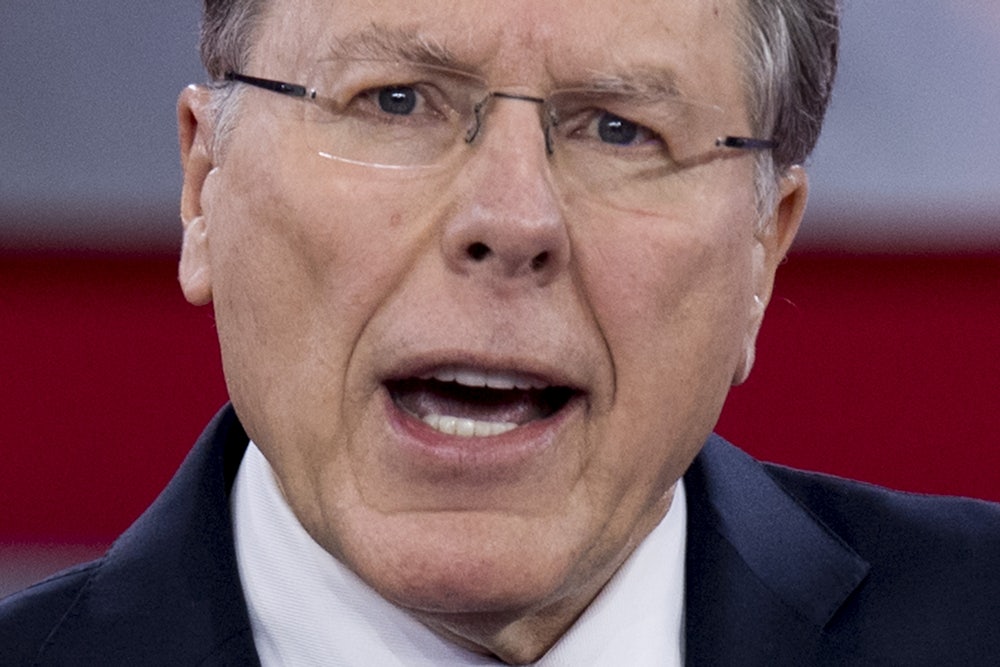Florida legislators handed the National Rifle Association a rare defeat last week when it passed new restrictions on guns. But the moment Governor Rick Scott, a Republican and longtime NRA ally, signed the bipartisan bill, the gun-rights organization took the state to court.
The new law prohibits gun sales to people under 21, requires a three-day waiting period for purchases, allows some school personnel to be armed, bans so-called bump stocks, and empowers police to temporarily confiscate weapons from certain people deemed a threat. The law doesn’t prohibit gun ownership for 18-to-20-year-olds, nor does it apply to guns exchanged between family members. It also includes a carveout for those serving in the military or working in law enforcement.
Nonetheless, in a lawsuit filed Friday, the NRA asked a federal court in Florida to overturn the new minimum age on gun purchases, arguing that it violates the Second Amendment. “The effect of Florida’s age-based ban is to impose a significant, unequal, and impermissible burden on the right to keep and bear arms of a class of millions of law-abiding 18-to-20 year-old adult citizens,” the organization told the court in its complaint.
The lawsuit comes as the NRA faces growing opposition from gun-control advocates, who renewed their push for stricter laws after a 19-year-old gunman killed 17 students and teachers last month at Marjory Stoneman Douglas High School in Parkland, Florida. Even President Donald Trump appeared to embrace more stringent measures after the massacre, although he reversed his support for age restrictions on Monday.
Adam Winkler, a UCLA law professor who specializes in the Second Amendment, is skeptical that the NRA will succeed. He described the lawsuit as “mostly a symbolic measure” under current Supreme Court precedents. “There’s almost no chance it will prevail in court,” he told me. “Federal courts have consistently upheld age restrictions on firearms.”
This isn’t the first time that the NRA has challenged such restrictions. In 2011, it asked federal courts in Texas to overturn a 1960s-era provision in federal law that bars federally licensed dealers from selling handguns to adults under the age of 21. The limit is modest in scope: Americans between the ages of 18 and 20 can still lawfully own and use handguns, the restriction doesn’t apply to rifles or shotguns, and those affected can still obtain a handgun from a family member.
Nonetheless, the provision gave the NRA an opportunity to test the scope of the Supreme Court’s recent landmark rulings in 2008’s District of Columbia v. Heller and 2010’s McDonald v. Chicago. A sharply divided 5-4 majority in Heller ruled for the first time that the Second Amendment protects an individual right to own guns. At first, Heller only affected D.C. and the federal government; the justices divided along the same lines two years later in McDonald to apply it to state and local laws.
In an apparent effort to avoid throwing thousands of federal, state, and local gun regulations nationwide into chaos, the court’s conservative justices offered words of caution. Justice Antonin Scalia, writing for the Heller majority, noted that “nothing in our opinion should be taken to cast doubt on longstanding prohibitions on the possession of firearms by felons and the mentally ill, or laws forbidding the carrying of firearms in sensitive places such as schools and government buildings, or laws imposing conditions and qualifications on the commercial sale of arms.”
Federal courts relied on that language against the NRA. A federal district court judge declined to overturn the ’60s-era law, and the Fifth Circuit Court of Appeals upheld the ruling. The three-judge panel found that enough historical evidence existed to conclude that the federal age limit on handgun sales “is consistent with a longstanding, historical tradition, which suggests that the conduct at issue falls outside the Second Amendment’s protection.”
The justices declined to hear the case in 2014, leaving the Fifth Circuit ruling intact in that jurisdiction without setting a national precedent. “The Supreme Court has yet to rule on the issue, so maybe there’s a slight possibility the NRA could win,” Winkler said. “However, the Supreme Court refused to reconsider the Texas ruling, suggesting there aren’t a majority of justices interested in revisiting the question.”
There’s no reason the justices wouldn’t be able to take the latest NRA case and decide the underlying constitutional question if it reaches them. But it would be a departure from what has been a conspicuous eight-year silence on gun rights since the landmark decisions in Heller and McDonald. That abstention drew the ire of Justice Clarence Thomas last month when his colleagues declined to hear a challenge to California’s 10-day waiting period on gun purchases. “The right to keep and bear arms is apparently this court’s constitutional orphan,” he wrote in a dissent.
Even if the NRA doesn’t prevail on the merits, a losing battle could benefit the organization. “It’s sending a powerful signal to its members and to elected officials that it’s fighting for gun rights at every turn,” Winkler said. “It’ll almost certainly lose the lawsuit, but it’ll nonetheless serve the NRA’s political purposes.”
